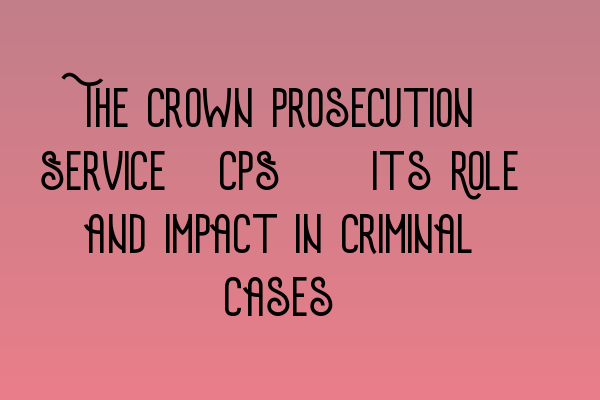The Crown Prosecution Service (CPS): Its Role and Impact in Criminal Cases
Welcome to the blog of SQE Criminal Law & Practice Law UK, where we discuss important topics related to criminal law. Today, we will delve into the role and impact of the Crown Prosecution Service (CPS) in criminal cases.
What is the Crown Prosecution Service?
The Crown Prosecution Service (CPS) is an essential component of the criminal justice system in England and Wales. It is an independent prosecuting authority responsible for prosecuting criminal cases on behalf of the state. The CPS works closely with the police and other investigative agencies to ensure that offenders are brought to justice.
The Role of the CPS
The primary role of the CPS is to make fair and impartial decisions about whether to prosecute cases investigated by the police. This involves reviewing evidence, considering the public interest, and determining whether there is a realistic prospect of conviction. The CPS aims to ensure that only cases with sufficient evidence and public interest grounds proceed to court. This helps prevent unnecessary strain on the judicial system and protects the rights of the accused.
The CPS also provides legal advice to the police during the early stages of investigations. This ensures that the police gather evidence in a way that is compliant with legal requirements and maximizes its potential in court. The CPS acts as a gatekeeper, filtering out cases that may lack sufficient evidence or public interest, and focusing resources on those that have a higher chance of success.
Working with the CPS
If you are involved in a criminal case, whether as a defendant, witness, or victim, it is important to understand the role of the CPS and how it impacts the proceedings. The CPS will carefully examine the evidence against you or the accused and assess the strength of the case. This evaluation will help determine the best course of action, such as negotiating a plea deal or proceeding to trial.
Supporting evidence, witness statements, and other documentation will be shared with the CPS during the pre-trial phase. It is crucial to cooperate fully with the CPS and provide any relevant information or materials that can assist in the decision-making process. Open and honest communication with your legal representation is vital to ensure the best possible outcome in your case.
The Impact of the CPS
The CPS plays a significant role in maintaining the integrity and fairness of the criminal justice system. By carefully evaluating cases and ensuring there is sufficient evidence, the CPS helps reduce the risk of wrongful convictions. It also promotes transparency and accountability, as its decisions are subject to review and scrutiny.
The CPS’s decisions can have a profound impact on the lives of those involved in criminal cases. For victims, the decision to prosecute can provide a sense of justice and closure. For defendants, it is crucial to have confidence in the impartiality and professionalism of the CPS to protect their right to a fair trial.
If you want to learn more about the roles and responsibilities of legal professionals within the criminal justice system, we offer SQE 1 Practice Exam Questions and SQE 1 Practice Mocks FLK1 FLK2. These resources will help you prepare for the Solicitors Qualifying Exam (SQE) and gain a deeper understanding of criminal law and practice in the UK.
Conclusion
The Crown Prosecution Service (CPS) is an integral part of the criminal justice system in England and Wales. Its role in making impartial decisions about whether to prosecute cases ensures the fair administration of justice. Understanding the CPS’s function and impact is essential for anyone involved in criminal cases. To further enhance your legal knowledge and sharpen your skills, explore our SQE 2 Preparation Courses and SQE 1 Preparation Courses.
For more information about the SRA SQE Exam Dates, visit our website.
